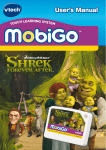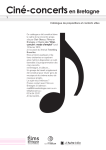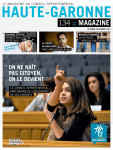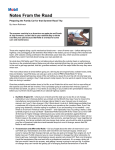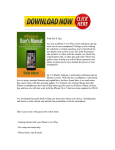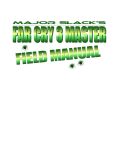Download Jekyll & Hyde
Transcript
Jekyll & Hyde By r. l. Stevenson Adapted by & with dario costa Directed by Carla tomé image tehau paea teaching guide © 2014 Drama Ties theatre company 1 contents "All human beings are commingled out of good and evil." R.L. Stevenson 1 image 2 contents 3 statement of intent/summary 4 note d’intention/sommaire 5 scene extract #1+ #2 6 scene extract #2 cont + Vocabulary 7 scene extract #3 8 scene extract #3 cont + Vocabulary 9 original versus adapted text 10 comprehension questions/discussion question 11 grammar corner 12 grammar corner cont. 13 watching the show Quick quiz 14 about the author: R.L. Stevenson 15 an actor’s approach: drama exercises 16 drama exercises cont. 17 crossword 18 extra activity- cooking recipe/ a word about the actor 19 A word about the director Enjoy the Teaching Guide, but most of all, enjoy the show! © 2014 Drama Ties theatre company 2 Statement of Intent A gothic and ghostly tale. Who is the real monster in the story of Dr. Jekyll and Mr. Hyde? This riveting show explores how one person can be many. We behave in different ways- sometimes by choice, sometimes by chance. Can we separate ourselves into two parts- into the good and the bad? Once we are on the path of experimentation there is no easy solution… A SOLO SHOW Summary A modern-day Jekyll invite two friends to dinner. They are Utterson and Lanyon. Jekyll narrates the main story and has an alter-ego who narrates parts in French. The play is divided into 7 Scenes: Scene 1: The Dinner Jekyll greets his two ‘friends’ for dinner- Utterson and Lanyon. Scene 2: The Revelation Jekyll tells his ‘friends’ about how to separate good from evil. Scene 3: The Experiment Jekyll prepares a potion, drinks it and becomes Hyde. Scene 4: The Child The incident of the trampling of the child by Hyde. Scene 5: The Murder The incident of the murder of the old gentleman by Hyde. PARTICIPATION SCENE: THE ACTOR WILL CHOOSE TWO YOUNG STUDENT ACTORS FROM THE AUDIENCE AND GUIDE THEM THROUGH THIS SCENE. ONE WILL PLAY MR. HYDE AND THE OTHER WILL PLAY THE OLD GENTLEMAN. SOME PREPARATION WITH THE STUDENTS CAN BE DONE BEFORE THE SHOW BEGINS. Scene 6: The Uncontrollable Changing Jekyll cannot control the change from Jekyll to Hyde anymore. Scene 7: The Finale We can all have a dual personality… © 2014 Drama Ties theatre company 3 Note d’intention Une histoire gothique et fantomatique. Qui est le vrai monstre dans Dr Jekyll et Mr Hyde? Ce spectacle explore la dualité de l’homme. Nous nous comportons de différents manières- parfois par le choix, parfois par la chance. Peut-on séparer sa personne en deux parties- entre le bien et le mal ? Une fois lancé dans l’expérimentation le destin fait son chemin, sans pouvoir le contrôler… SOMMAIRE Dr. Jekyll invite deux amis à diner. Ce sont Utterson et Lanyon. L’histoire principale est racontée par Jekyll. Jekyll a un alter-ego qui parle en français de temps en temps. La pièce est divisée en 7 scènes : Scène 1 : Le Diner Jekyll accueille ses deux ‘amis’ au diner- Utterson et Lanyon. Scène 2 : La Révélation Jekyll raconte à ses amis comment il sépare le bien du mal. Scène 3 : L’Expérience Jekyll prépare une potion, la boit et devient Hyde. Scène 4 : L’Enfant L’incident du piétinement de l’enfant par Hyde. Scène 5 : Le Meurtre L’incident du meurtre du vieil homme par Hyde. SCENE INTERACTIVE : DEUX ELEVES VONT JOUER LES PERSONNAGES DE M. HYDE ET LE VIEIL HOMME. Scène 6 : Le Changement Incontrôlable Jekyll n’arrive plus à contrôler la transformation entre Jekyll et Hyde. Scène 7 : Le Finale Nous pouvons tous avoir des personnages doubles... © 2014 Drama Ties theatre company 4 Scene extract #1 From Scene 1: The Dinner Jekyll : ‘My name is Jekyll. Dr. Henry Jekyll. I am a descendant of that other Jekyll. Tonight I am having a dinner party. BUT, I am getting ahead of myself. EVERYONE knows the story of Dr. Jekyll and Mr. Hyde. The famous American comedian Jerry Lewis played a version of him in ‘The Nutty Professor’, Stan Laurel from Laurel and Hardy played him as Dr Pyckle and Mr Pryde. The Who sing Dr. Jekyll and Mr. Hyde.’ Scene extract #2 From Scene 1: The Dinner Jekyll: Welcome to both of you! Dinner is served! Dig in! Tuck in! Only the very best ingredients! Freshly picked, prepared, popped into the oven, put on your plate. Pecked at by you! Utterson: What is in it? Jekyll: Now, now, I’m not going to give my secrets away. Lanyon: Ah come on! Tell us. Jekyll: No. Utterson: Just a little clue? Jekyll: No! Do you like it? Utterson: Ah, yes, yes. This is an absolutely splendid meal. Perfetto! eccellente! 5 Lanyon: Oh yes! The bee’s knees of a dinner! Jekyll: You’re flattering me! As Shakespeare’s Macbeth said “false face must hide what the false heart doth know” “there is no art to find the mind’s construction in the face.” Utterson: Ma che cosa dice? What is he saying? Jekyll: I incline to Cain’s heresy. I let my brother go the devil in his own way. You my friends flatter me. Utterson/ Lanyon: OH, NO, NO, NO! Jekyll: OH YES, YES, YES. Each of you is lying! You don’t like it at all! What are you afraid of? Overpraising, overdoing it, laying it on thick! Lanyon: Huh? No, not at all. Take it easy Jekyll. What’s up with you? Jekyll: Nothing! Nothing at all! Think of the meanest thing you ever did. Alright. Why did you do it? Wait! Before you answer that, do we know why we suddenly do something mean? Even your parents can be awful now and then. Or your nice old grandpa. Or the President of the Republic. Everyone is greedy sometimes…rude…selfish… mean. No one is perfect. It is alright to be human, or is it? Sometimes when I am bad-tempered a friend will say, ‘Jekyll is not himself today.’ And this makes me wonder. If I am not myself, who am I?” Vocabulary: Welcome- bienvenue; dig in- allez-y; tuck in- mangez; oven- four; clue- indice; ‘the bee’s knees’- la meilleure; lying- mentir; overpraising- faire des éloges; overdoing- trop faire; laying it on thick- mettre le paquet;meanest- le plus méchant; awful- méchant; greedygourmand; rude- brusque; selfish- égocentrique; bad-tempered- de mauvais humeur; wondersonger 6 Scene extract #3 From Scene 3: The Experiment Jekyll: With every day, and from both sides of my intelligence, the moral and the intellectual, I drew nearer to that truth that man is not truly one, but truly two and I hazard the guess that man will be ultimately known for a mere polity of multifarious, incongruous, and independent denizens. One person is many. I dwelt with pleasure on the thought of the separation of these elements. If each, I told myself, could be housed in separate identities, life would be relieved of all that was unbearable. How, then, were they dissociated? Lanyon: WHAT? Jekyll: Split apart! Separated! Lanyon: WHO? Jekyll: Not who, but what? Good and evil! Right and Wrong! Brave Macbeth and Evil Tyrant Macbeth! Batman and the Joker! I was so far in my reflections when, as I have said, a light began to shine upon the subject from the laboratory table. Utterson: As long as it was not from the kitchen table. Jekyll: I hesitated. I knew well that I risked death. If I drank this potion, I risked death. Lanyon: Wait! Don’t tell me. You took the potion and you turned into an animal!? Look at this! Now, you. 7 Utterson: Me? Alright I can turn into a ….NO! I won’t do it! Jekyll: Quiet! This is serious! I had long since prepared my potion; I purchased at once from a chemist, a large quantity of a particular salt which I knew to be the last ingredient required; and late one accursed night, I compounded the elements, watched them boil and smoke together in the glass. At first it was red, and then slowly to a watery green and finally to a deep purple… … and with courage, I drank off the potion. The most racking pangs succeeded: a grinding in the bones, deadly nausea. Then these agonies began to subside, and I came to myself as if out of a great sickness. There was something strange in my sensations, something new and incredibly sweet. I felt younger, lighter, happier. I knew myself to be more wicked and the thought delighted me. I stretched out my hands, exulting in the freshness of these sensations. Whereas Jekyll was good, Hyde was pure evil. *Vocabulary:truth- vérité; hazard the guess- soupcon; known- connu; polity- régime; multifarious-multiple; denizens-habitants;’dwelt’- penser à; relieved- soulagé; split apartséparé en deux; shine- illumine; kitchen- cuisine; death- la mort;werewolf- loup garou; purchased- acheté; chemist- pharamcie; accursed- maudit; boil- bouillir; smoke- fumer; racking pangs- douleurs terribles; grinding- grincement; subside- arreter;sickness- maladie; sweet- douce;wicked- méchant; stretched- tiré; freshness- fraicheur; © 2014 Drama Ties theatre company 8 ORIGINAL versus ADAPTED TEXT Proposition: When an actor takes a text they can adapt it to their own needs and goals. In this case, Stevenson’s text has been shortened and certain words have been changed from the original. In this exercise you have to read the text carefully and answer the five comprehension questions at the end. There is also a discussion question to follow. From Scene 5: The Murder “A year later London was startled by a crime of singular ferocity. A woman living alone had gone up-stairs to bed about eleven. Although a fog rolled over the city the night was cloudless, and the lane was brilliantly lit by the full moon. And as she sat she saw an aged and beautiful gentleman, walking along; and in the other direction another very small gentleman. When they had come within talking distance the older man bowed with a very pretty manner of politeness. From his pointing, it seemed as if he were only asking for directions. Her eye wandered to the other, and she recognized Mr. Hyde. He had in his hand a heavy walking stick, which he was trifling with. He said nothing and seemed to listen with impatience. And then all of a sudden he broke out in a great flame of anger, stamping with his foot, brandishing the walking stick, and acting like a madman. The old 9 gentleman took a step back, surprised and offended and at that Mr. Hyde clubbed him to the earth. And next moment, with ape-like fury, he was trampling his victim under foot and hailing down a storm of blows, the bones were shattered and the body jumped upon the roadway. At the horror of these sights and sounds, the woman fainted.” COMPREHENSION QUESTIONS 1. What words are used to describe the start of the scene? How does it make you feel? Suspenseful? Mysterious? Dangerous? 2. Who did the woman see? 3. What was Mr. Hyde carrying and what did he do with it? 4. Choose one action that Mr. Hyde did and write down these words. Then paraphrase this using your own words. 5. What did the woman do at the end? DISCUSSION QUESTION A Witness’s Story. Sometimes we can be witness to an eventsometimes good, sometimes bad. Think of an incident that you witnessed. Describe how you felt and what you said and did. Did you surprise yourself with how you behaved? Could you have behaved differently? © 2014 Drama Ties theatre company 10 Grammar corner From Scene 6: The Uncontrollable Changing Jekyll: ‘This Mr Hyde that I called out of my own soul was a malignant and villainous man; he only thought about himself; drinking pleasure with bestial avidity. Henry Jekyll stood at times aghast before the acts of Edward Hyde. It was Hyde, after all, and Hyde alone, that was guilty. Jekyll would wake up as if nothing had happened. And so Jekyll’s conscience slept.’ 1. Vocabulary: Match the English word with the French equivalent: Malignant Coupable Avidity Nocif Guilty Atterré Aghast Conscience Conscience Avidité 2. Word Order: Put these words in the right order to make the sentence. be a the rose I mirror of through once change the aware I the house Edward of rushed moment passed was began I to to I I to importance the Hyde more 11 3. Verbs: Verbs give the beat and rhythm to a sentence. It gives a text power. In this passage, find and underline the main verbs. When you stress the verbs you can see how the passage becomes more active and visual. This is towards the end of the story where Poole and Utterson are just about to break into Dr. Jekyll’s laboratory: From Scene 7: The Finale Poole: “Well, Mr. Utterson, all this last week him, or it, has been crying night and day for some sort of medicine. It was sometimes Dr Jekyll’s way to write his orders on a sheet of paper and throw it on the stair. We've had nothing else; nothing but papers, and a closed door, and the very meals left there to be smuggled in when nobody was looking. Well, sir, every day, ay, and twice and three times in the same day, there have been orders and I have been sent flying to all the chemists in town. Every time I brought the stuff back, there would be another paper telling me to return it, because it was not pure. This drug is wanted bitter bad, sir.” Questions: 1. How many verbs did you find? 2. Can you find one phrasal verb? Can you replace it with another verb? 3. Can you think of other verbs to replace at least two verbs in the above passage? 4. Choose one sentence and put it in your own words- don’t forget to choose a powerful verb. 12 Watching the show Quick quiz 1. What period was the story written in? 2. What famous American comedian played Dr. Jekyll? 3. What object can’t Jekyll find? 4. Through which door do jekyll’s ‘friends’ pass? 5. What two nationalities are jekyll’s ‘friends’? 6. What two qualities make up men and women? 7. What does Jekyll prepare in his laboratory? 8. Who did Hyde trample on? 9. Who did Hyde murder? 10. What part of his body did Jekyll look at to see he had changed back into Hyde in scene 6? 11. What character does the ‘Italian’ play in scene 7? 12. What character from the story does the ‘australian’ play in scene 7? 13. Was dr jekyll’s body found? 14. Who is the real monster in Jekyll and Hyde? 15. What was your favourite part in the story? 13 About the author R. L. Stevenson Robert Louis Stevenson was born in Edinburgh, Scotland in 1850 and died in Samoa in 1894 at the age of 44. He migrated to Samoa for his health which was poor throughout much of his life. ‘Strange Case of Dr. Jekyll and Mr. Hyde’ was written in Bournemouth, England and the story came to Louis in a dream. He wrote the story quite quickly and had an instant success, thus making Louis’s reputation. Origins on why he wrote the story vary: some said he based it partly on a very close childhood friend; others said because of preoccupations with his own strict Presbyterian upbringing in Scotland where there was always a conflict between being ‘good’ and doing ‘bad.’ He always had a preoccupation with man’s double nature and struggled to find the right way in telling his story. Stevenson said most of it came to him in a dream. He began taking an interest in the subconscious which was coming into vogue at this time with many scientific papers dedicated to it. Many writers praised the book, notably the English poet G.M. Hopkins. On the other hand some writers were less enthusiastic: Henry James complained of the book’s sensationalism, Myers sent a long list of possible revisions, and Symonds wrote: it is indeed a dreadful book! Discussion questions: 1. Do you know any other stories by r. l. Stevenson? 2. What films on Jekyll and Hyde have you seen? 3. What songs do you know on this theme? 14 An Actor’s Approach Drama Exercises The walk 1. Proposition: A very famous actor, Sir Alec Guinness once said that as soon as he found the character’s walk he found the character. All sit in a big circle facing inwards. One person starts to walk around the inside of the circle, or if there is room, the outside of the circle. Another person stands up and follows them- copying the first person’s movement. A third person stands up and copies the second, while the first person sits down. Continue in this way. See how the walk changes. Try this again and add an improvised line of text at the end. Breathing & concentration 2. Proposition: It is very important to breathe properly when you speak. This is a simple exercise to help you breathe better before speaking. In a circle all stand still, facing the centre of the circle and with eyes open breathe in through the nose and out through the mouth. Try this 5 times. Now try it with your eyes closed and in silence. Say one word ‘e.g. Hello’ to the person opposite you and so on around the circle. Be calm, concentrated and make eye contact with the person you are speaking to. Extend ‘Hello’ into a short sentence e.g. ‘It’s a beautiful day/You are beautiful’ etc. Speaking solo 3. Proposition: It isn’t easy to stand in front of an audience and address a text to them. Choose a short text (it could be from this teaching guide or a text that you are working on in class). It’s important that everyone respects each other, listens to each other and give positive feedback. One person stands in front of the class with the text. Take a deep breath, look at your audience and then begin reading. Always pause at the end of each sentence and make eye contact with your audience. Are they listening to what you are saying? Are they concentrating? Why? Why not? Experiment with the power of the voice. 15 Different personalities 4. Proposition: Some actors are very good at imitating people in life. Many actors are very good at accents. Can you think of any French actors who do this? All start to walk in the space in a very calm and silent way and choose two emotions. When your teacher claps their hands you take on the 1st emotion. When your teacher claps again you take on the 2nd emotion. Your teacher claps again and you go back to the 1st emotion and so on….When you have practiced for 5 minutes, try this without the teacher clapping. The final step is to add words. First of all choose a line of text e.g. ‘This is an absolutely splendid meal.’ First of all say it with a ‘happy’ emotion and then say it with an ‘angry’ emotion. Choose your own texts. This is one way to practice changing characters quickly. Other ways you can try are to adopt a different gesture for 2 different characters e.g. bent over to be ‘old’ and to stand up very straight to be ‘strict.’ You can also use masks, hats, wigs but you must be very quick to put them on and take them off. You can also use a screen or ‘paravent’ to hide behind and when you put your head out one side you are one character and on another side you are a different character. Try and list other ways and techniques to ‘become’different characters. If you are in a group of 3 you can try and write a short sketch where each actor has to play 2 characters. And of course, practice a lot! On the following page you’ll find a crossword made from the Crossword maker at Teacher’s Corner http://worksheets.theteacherscorner.net/make-your-own/crossword/ 16 17 EXTRA ACTIVITY Cooking recipe If you look for cooking recipes on this theme you may like to try this special recipe: http://simmerboston.com/2010/04/banana-bread-jekyll-and-hyde/ A word about the actor DARIO COSTA Comédien australien, metteur en scène et professeur de théâtre. Il a commencé sa carrière dans le théâtre de rue et le théâtre pour jeune public en Tasmanie. En 1992 il vient s’installer à Paris afin de poursuivre ses recherches théâtrales et il s’inscrit à l’École Internationale de Théâtre Jacques Lecoq. Il a joué dans un répertoire varié en anglais et en français, notamment En Attendant Godot, Les Cambrioleurs, Les Nains Mode d’Emploi, Croisade de Michel Azama, Betrayal, et The Dumb Waiter d’Harold Pinter. On a pu le voir également dans le dernier film de Marco Ferreri, Nitrate d’Argent. Il travaille avec Drama Ties depuis 2000, et a joué dans Twainheart, POE-Pourri !, Rumpelstiltskin, Robin Hood, Snow White’s Black Heart, The Quest for the Gorgon’s Head (qu’il a également co-écrit), Rapunzel Rebels, ShakesPod et Gulliver’s Travels. En 2009, il met en scène The Story Hunters -Les Fables d’Esope. Il crée et joue son propre solo sur l’Australie : Journey to Australia. 18 A WORD ABOUT THE DIRECTOR CARLA TOME Comédienne, metteur en scène, régisseuse et professeur de théâtre. Elle est originaire du Vénézuela, où elle a grandi et fait ses études de danse classique et moderne au Conservatoire National de Danse Keyla Ermecheo. Aux États-Unis, elle termine ses études de théâtre, de metteur en scène, et de gestion et développement des arts en milieu éducatif à l'Université du Massachusetts (UWW) en 2004. Entre 1999 et 2005, elle a travaillé avec la compagnie Serious Play! Théâtre Ensemble sous la direction artistique de Sheryl Stoodley. Elle est arrivée en France en 2006 afin de poursuivre sa formation en suivant le Laboratoire d'Étude du Mouvement (LEM) à l'École Internationale de Théâtre Jacques Lecoq. Depuis 2007 elle travaille avec la compagnie Drama Ties. Avec eux elle a fait la création lumière et son pour l'ensemble des spectacles. Elle a joué dans Rumpelstiltskin et Story Hunters, a co-écrit Hood's Got Talent, et en 2010, elle a écrit et mis en scène Verdict of Sorcery, pièce que a joué au Vingtième Théâtre à Paris et par tout en France 2010 et 2012. Elle a mis en scène Twainheart en 2013. Dario costa would like to thank all at drama ties for their support in the preparation of this project. © 2014 Drama Ties theatre company 19




















